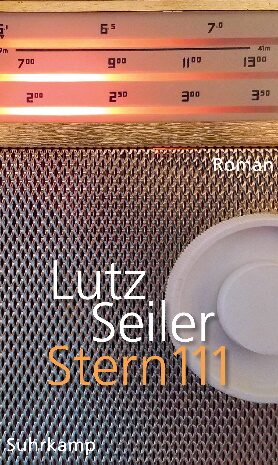Lutz Seiler
Stern 111
[Star 111]
- Suhrkamp Verlag
- Berlin 2020
- ISBN 978-3-51842-925-9
- 528 Pages
- Publisher’s contact details
Published in Greek with a grant from Litrix.de.
Sample translations
A visionary take on the Wende
More recently, indeed, the issue appeared to have taken a back seat - until the 30th anniversary of unification served to bring it to the fore once again. Lutz Seiler, born in 1963 in the Thuringian town of Gera, was not the only author to respond to the challenge, but his novel Stern 111 stands out from its competitors thanks to a poetic radiance that appears fully worthy of the star in its title. And yet what lies behind it is a mere radio - a portable radio that enabled the 16-year-old in Thuringia to listen-in to the big wide world and which in the process turned into an emblem instinct with promise for the future.
Lutz Seiler had already achieved distinction as a writer of both poetry and prose by the time he won the German Book Prize in 2014 for his first novel, Kruso. Even more than in his debut novel, he weaves autobiographical elements into his new book, making use of the powerful authenticity, rich imagery and sensuous immediacy of his memories to give his fiction additional vitality. Above all, however, he directs our attention to an aspect of the Wende that has not previously found literary expression: the protagonist, Carl Bischoff - time-served bricklayer, ex-soldier, university dropout and aspiring poet - experiences the brief period of transition from one social system to another as a time-window full of risks and opportunities, daring experiments and utopian visions. Such things come to nothing in the face of the ensuing reality with its unyielding mix of the new and the old - but out of the turmoil there emerges a poet that we have no difficulty in recognising as Lutz Seiler.
It begins with Carl being caught by surprise: his parents, an unremarkable couple from the depths of the Thuringian provinces, decide there and then to go off to the West to try and make a fresh start. Their son, who happens at that point to be in the throes of a major existential crisis, is supposed to stay behind in Gera and look after their house, car and workshop. But soon he, too, decides to get away, and before long he finds himself in the underground scene in East Berlin, where he pals up with a ‘smart gang’ of outsiders who are trying out alternative ways of living and supporting themselves. In this somewhat bizarre milieu Lutz Seiler contrives in a decidedly romantic spirit to create a space for the enactment of free-ranging fantasies, underpinned by a finely wrought web of literary subtexts and allusions. The narrative as a whole, however, remains firmly rooted in reality thanks to the world of ‘things’, so characteristic of the period, which the author calmly, repeatedly and very expressively draws on, and of which the eponymous radio of the novel’s title is also part. Stern 111 - winner of the Leipzig Book Fair Prize - is not least an act of homage to craftsmanship and the rapidly vanishing machine age.
In his early years Lutz Seiler trained as a craftsman in the building trade - and he has remained an excellent craftsman in his writing, too. By successfully combining the epitomisation of an era, linguistic elegance and a subtly conveyed political message, he has created what we can safely describe as a masterpiece. And if at some point in the future this book does indeed enter the literary pantheon as the great representation of the Wende, it will certainly have deserved its place.
Translated by John Reddick

By Kristina Maidt-Zinke
Kristina Maidt-Zinke is a book and music critic at the Süddeutsche Zeitung and also writes reviews for Die Zeit.
Publisher's Summary
Two days after the Fall of the Berlin Wall, Inge and Walter Bischoff leave their old life behind – the apartment, the garden, their work and the country. Their journey takes the two fifty-year- olds far away: Through transit camps and temporary accommodations they follow a dream they have long since fostered, a »life secret« even their son Carl knows nothing about.
Carl, on the other hand, abandoning his task of minding his parents’ apartment in the small town of Gera, escapes to Berlin. He lives on the streets until he is accepted into the »smart pack«, a group of young men and women who pursue dark operations, guerrilla warfare for empty buildings and the pub Assel. With the pack and the Assel as his base, Carl drifts through the archaic chaos of post-reunification, always in hopes of seeing Effi again, »the only woman he had ever been in love with.«
A panorama of the first years after German reunification in East and West: After his bestseller Kruso, which was awarded the German Book Prize and has been translated into 22 languages, Lutz Seiler continues the story in two grand narrative arcs – in a road trip that spans halfway across the globe and in a Berlin novel that shows us the first days of a new world. And in passing, he tells the story of a family blown apart by the Autumn of ‘89 who must now find each other again.
(Text: Suhrkamp Verlag)
